VW Touareg vs Hyundai IONIQ 9 – Which car suits you better?
Both models have their strengths – but which one suits you more?
Compare performance, efficiency, price and space directly: VW Touareg or Hyundai IONIQ 9?
Here’s where it gets real: The technical differences in detail
Costs and Efficiency: When it comes to price and running costs, the biggest differences usually appear. This is often where you see which car fits your budget better in the long run.
Hyundai IONIQ 9 has a slight advantage in terms of price – it starts at 58700 £, while the VW Touareg costs 63200 £. That’s a price difference of around 4513 £.
As for range, the Hyundai IONIQ 9 performs convincingly better – achieving up to 620 km, about 569 km more than the VW Touareg.
Engine and Performance: Power, torque and acceleration say a lot about how a car feels on the road. This is where you see which model delivers more driving dynamics.
When it comes to engine power, the VW Touareg has a minimal edge – offering 462 HP compared to 428 HP. That’s roughly 34 HP more horsepower.
In acceleration from 0 to 100 km/h, the VW Touareg is hardly perceptible quicker – completing the sprint in 5.10 s, while the Hyundai IONIQ 9 takes 5.20 s. That’s about 0.10 s faster.
In terms of top speed, the VW Touareg performs somewhat better – reaching 250 km/h, while the Hyundai IONIQ 9 tops out at 200 km/h. The difference is around 50 km/h.
Both models offer the same torque – 700 Nm.
Space and Everyday Use: Beyond pure performance, interior space and usability matter most in daily life. This is where you see which car is more practical and versatile.
Seats: Hyundai IONIQ 9 offers distinct more seating capacity – 7 vs 5.
In curb weight, the VW Touareg is clearly perceptible lighter – 2059 kg compared to 2594 kg. The difference is around 535 kg.
In terms of boot space, the VW Touareg offers convincingly more room – 810 L compared to 338 L. That’s a difference of about 472 L.
In maximum load capacity, the Hyundai IONIQ 9 performs noticeable better – up to 2419 L, which is about 619 L more than the VW Touareg.
When it comes to payload, VW Touareg to a small extent takes the win – 751 kg compared to 643 kg. That’s a difference of about 108 kg.
All in all, the Hyundai IONIQ 9 shows itself to be is largely superior and secures the title of DriveDuel Champion.
It impresses with the more balanced overall package and proves to be the more versatile companion for everyday use.
VW Touareg
The VW Touareg stands out in the luxury SUV market with its blend of sophisticated design and advanced technology. Its interior exudes an air of refinement, featuring premium materials and state-of-the-art infotainment systems. On the road, the Touareg offers a smooth and dynamic driving experience, effortlessly combining power and precision handling.
details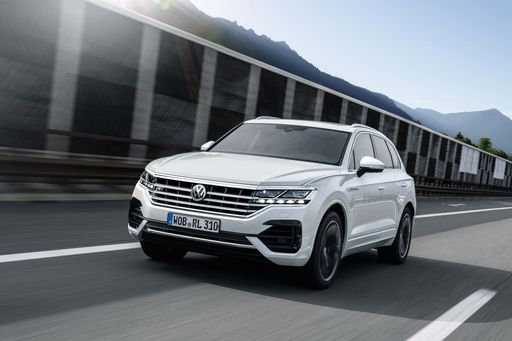 @ Volkswagen
@ Volkswagen
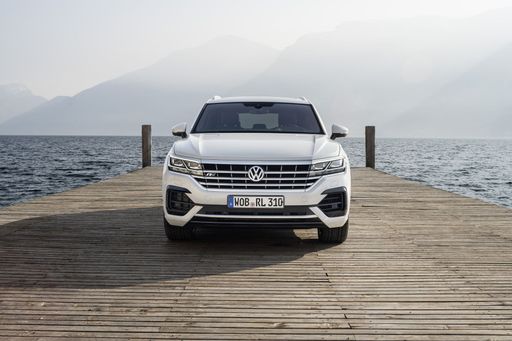 @ Volkswagen
@ Volkswagen
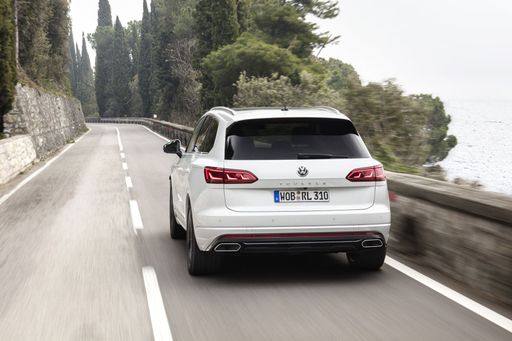 @ Volkswagen
@ Volkswagen
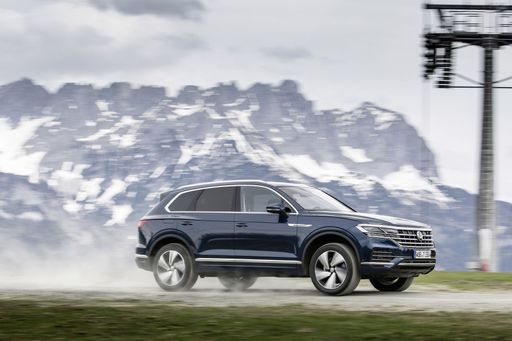 @ Volkswagen
@ Volkswagen
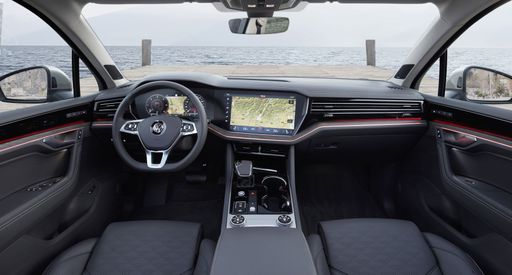 @ Volkswagen
@ Volkswagen
Hyundai IONIQ 9
The Hyundai IONIQ 9 is a bold step forward in the automotive world, combining cutting-edge electric technology with a sleek and modern design. This model stands out with its spacious interior and advanced features, ensuring both comfort and convenience for drivers and passengers alike. As Hyundai pushes the envelope in eco-friendly innovation, the IONIQ 9 represents the future of sustainable driving with its impressive range and performance capabilities.
details

|
|
|
|
|
Costs and Consumption |
|
|---|---|
|
Price
63200 - 86000 £
|
Price
58700 - 74400 £
|
|
Consumption L/100km
2.2 - 10.5 L
|
Consumption L/100km
-
|
|
Consumption kWh/100km
-
|
Consumption kWh/100km
19.9 - 20.6 kWh
|
|
Electric Range
48 - 51 km
|
Electric Range
600 - 620 km
|
|
Battery Capacity
14.30 kWh
|
Battery Capacity
110 kWh
|
|
co2
48 - 239 g/km
|
co2
0 g/km
|
|
Fuel tank capacity
75 L
|
Fuel tank capacity
-
|
Dimensions and Body |
|
|---|---|
|
Body Type
SUV
|
Body Type
SUV
|
|
Seats
5
|
Seats
7
|
|
Doors
5
|
Doors
5
|
|
Curb weight
2059 - 2470 kg
|
Curb weight
2594 - 2689 kg
|
|
Trunk capacity
665 - 810 L
|
Trunk capacity
338 L
|
|
Length
4878 - 4902 mm
|
Length
5060 mm
|
|
Width
1984 mm
|
Width
1980 mm
|
|
Height
1693 - 1712 mm
|
Height
1790 mm
|
|
Max trunk capacity
1675 - 1800 L
|
Max trunk capacity
2419 L
|
|
Payload
550 - 751 kg
|
Payload
586 - 643 kg
|
Engine and Performance |
|
|---|---|
|
Engine Type
Plugin Hybrid, Petrol, Diesel
|
Engine Type
Electric
|
|
Transmission
Automatic
|
Transmission
Automatic
|
|
Transmission Detail
Automatic Gearbox
|
Transmission Detail
Reduction Gearbox
|
|
Drive Type
All-Wheel Drive
|
Drive Type
Rear-Wheel Drive, All-Wheel Drive
|
|
Power HP
231 - 462 HP
|
Power HP
218 - 428 HP
|
|
Acceleration 0-100km/h
5.1 - 7.7 s
|
Acceleration 0-100km/h
5.2 - 9.4 s
|
|
Max Speed
222 - 250 km/h
|
Max Speed
190 - 200 km/h
|
|
Torque
450 - 700 Nm
|
Torque
350 - 700 Nm
|
|
Number of Cylinders
6
|
Number of Cylinders
-
|
|
Power kW
170 - 340 kW
|
Power kW
160 - 315 kW
|
|
Engine capacity
2967 - 2995 cm3
|
Engine capacity
-
|
General |
|
|---|---|
|
Model Year
2023 - 2025
|
Model Year
2025
|
|
CO2 Efficiency Class
B, G
|
CO2 Efficiency Class
A
|
|
Brand
VW
|
Brand
Hyundai
|
Is the VW Touareg offered with different drivetrains?
Available configurations include All-Wheel Drive.
The prices and data displayed are estimates based on German list prices and may vary by country. This information is not legally binding.
